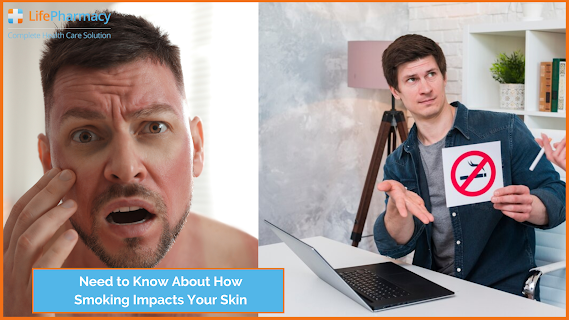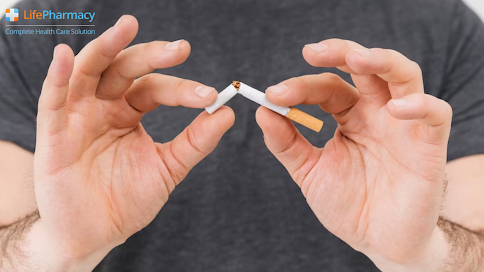In the realm of skincare, numerous factors can impact the health and appearance of our skin. One such factor that has garnered significant attention is smoking. Skincare is an important aspect of overall health and beauty, and smoking can harm the health and appearance of our skin. Smoking can damage the skin in many ways, including reducing blood flow, causing premature aging, and increasing the risk of skin cancer.
From premature aging to a host of other skin-related concerns, the correlation between smoking and skin health is an important area of study. This is why it's so important to know how smoking affects your skin and, if you smoke or are around people who smoke, to take action to improve your skincare regimen. In this article, we delve into the intricate relationship between smoking and skin health, shedding light on how smoking can adversely impact the largest organ of our body.
Related Posts: Dehydrated Skin: Causes, Symptoms, and How to Care For It
10 Ways Smoking Can Damage Your Body And Skin
1. Premature Aging
Smoking is a significant factor in the early aging of the skin. Two tobacco product poisons, nicotine, and carbon monoxide, narrow blood vessels and lessen the supply of oxygen and nutrients to the skin. As a result, the skin becomes deprived of essential nourishment, leading to a breakdown in collagen and elastin, the proteins responsible for maintaining the skin's firmness and elasticity. With decreased collagen and elastin production, the skin loses its ability to bounce back, forming fine lines, wrinkles, and sagging. Smoking also produces free radicals, highly reactive chemicals that harm cells and quicken the aging process.
2. Acne
The chemicals in tobacco smoke, particularly nicotine, can disrupt hormone levels in the body. This hormonal imbalance can increase the production of sebum, an oily substance that clogs the skin's pores. Acne can grow in an environment with excessive sebum production, a buildup of germs and dead skin cells, and these factors together.
3. Skin Tone and Pigmentation
Smoking can impact skin tone and pigmentation, leading to various complexion concerns. The formation and dispersion of melanin, the pigment responsible for skin color, can be impacted by tobacco products' toxic ingredients, including nicotine, tar, and carbon monoxide. One common effect of smoking on skin tone is uneven pigmentation or patchiness. Smoking can trigger an overproduction of melanin in certain areas, resulting in dark spots or hyperpigmentation. The most noticeable manifestation of these heightened pigmentation patches can be found on the hands, cheeks, and other areas regularly exposed to cigarette smoke.
4. Poor Wound Healing
Smoking harms wound healing, impairing the body's natural ability to repair and regenerate damaged skin. A healthy heart plays a crucial role in this process, as it ensures optimal blood flow and oxygen delivery to the injured area, promoting efficient healing. Smoking, however, endangers cardiovascular health and has a detrimental effect on heart health. Red blood cells carry less oxygen because of the hazardous chemicals in cigarette smoke, including carbon monoxide. As a result, the blood becomes less oxygen-rich, hindering the body's supply of sufficient oxygen to the wound site.
5. Skin Cancer
Squamous cell carcinoma and melanoma are two skin cancers more likely to develop due to smoking. Malignant tumors can form as a result of the significant DNA damage that cigarette smoke toxins can cause to skin cells. Squamous cell carcinoma is a serious skin cancer most likely to occur among smokers.
6. Infections
Smoking can increase the risk of infections, including those affecting the skin. The harmful chemicals in tobacco smoke weaken the immune system, making it less effective in defending the body against harmful pathogens. This compromised immune system can substantially affect the skin, leaving it more prone to infections. The skin is a barrier that prevents fungus, viruses, and bacteria from entering the body. Smoking, on the other hand, prevents the skin from acting as a barrier and makes it easier for diseases to enter the body. Additionally, smoking reduces the production of antibodies and immune cells crucial in identifying and eliminating infectious agents.
7. Eczema
Eczema is a persistent inflammatory skin condition characterized by rashes, dryness, and itching. Smokers may suffer harm from smoking. Although the precise link between smoking and eczema is not entirely understood, research indicates that smoking can worsen the symptoms of eczema and raise the risk of getting the condition. Quitting smoking is crucial for individuals with eczema to manage their symptoms effectively. By quitting, individuals can reduce inflammation, support skin barrier function, and improve overall skin health.
8. Palmar Telangiectasia
Palmar telangiectasia, also known as spider veins or spider-like blood vessels, can be influenced by Smoking. Telangiectasia is the dilation of small blood vessels near the skin's surface, resulting in fine, reddish, or bluish lines resembling spider webs. While palmar telangiectasia can have various causes, Smoking is considered a contributing factor. While Smoking can cause palmar telangiectasia, other variables, including genetics, hormonal changes, and specific medical disorders, can also contribute to its occurrence. People can increase blood flow and lessen vascular constriction by giving up Smoking, improving the blood vessels' ability to operate.
9. Vasculitis
Blood vessel inflammation is a hallmark of the disorder known as vasculitis, and getting the proper medical attention is crucial for its diagnosis and treatment. Online pharmacies may make some medications more convenient and accessible. Still, it's vital to remember that vasculitis is a complex ailment that calls for a careful examination by a medical practitioner. Vasculitis can affect various organs and body systems, leading to many symptoms and complications. A licensed healthcare professional should recommend and oversee the use of any drugs, including corticosteroids, immunosuppressants, and biologic therapies, used to treat vasculitis.
10. Psoriasis
Smoking has been noted as a substantial risk factor for psoriasis, a chronic inflammatory skin illness characterized by red, itchy, and scaly areas on the skin. Extensive research indicates that smoking can exacerbate psoriasis symptoms and increase the severity of the condition. The cigarette component nicotine is believed to contribute to the link between psoriasis and smoking. Smoking and the emergence of psoriasis are linked, according to numerous research. Compared to non-smokers, people who smoke have been proven to have an increased risk of acquiring psoriasis. Additionally, smoking has been directly related to a higher chance of developing psoriasis due to its frequency and intensity.
Related Posts: How does Smoking Affects and Causes Your Teeth
Conclusion
However, when it comes to addressing the impacts of smoking on the skin, it is crucial to consult healthcare professionals and reputable sources like UK online pharmacies. These online pharmacies provide a dependable setting for getting prescription drugs, professional advice, and correct information regarding treatments for skin conditions brought on by smoking.



Comments
Post a Comment